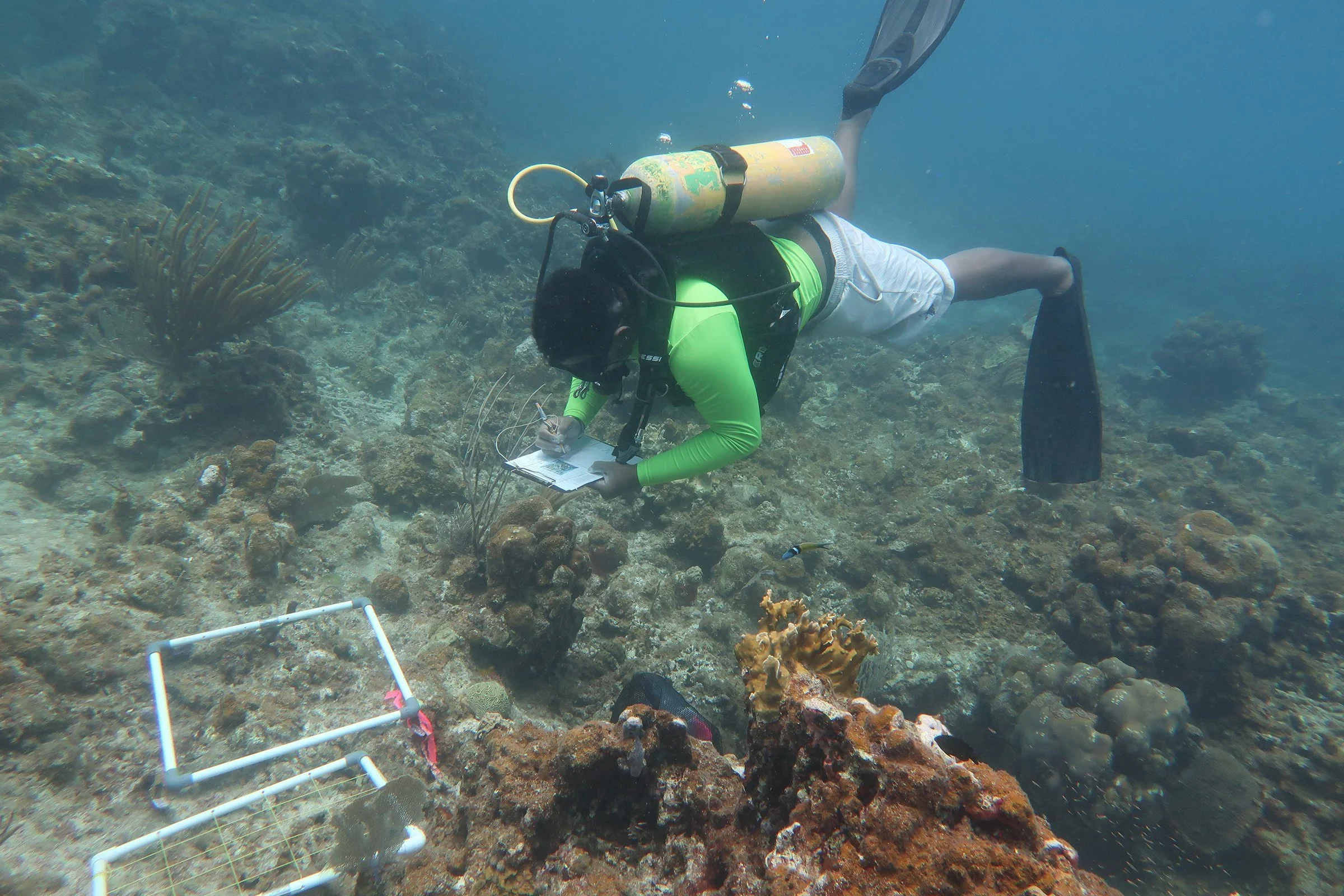Mare Nostrum Caribbean: Stewardship Through Strategic Research And Workforce Development
Mangroves play a critical role in the land and sea environments.
Our Caribbean Sea - 2014 – 2019
Mare Nostrum Caribbean, our third NSF RII grant, focused research on the marine ecosystems of the U.S. Virgin Islands. These systems are key to the economic viability and prosperity of the Territory however, they are vulnerable to both land-based and water-based human activities, as well as climatic and oceanographic change. VI-EPSCoR's goal under Mare Nostrum was to leverage the location of the US Virgin Islands' and UVI’s research capacity to study the issues and propose responses that support the natural resilience and tolerance of Caribbean coral reef ecosystems facing current and future external pressures.
Stewardship Through Strategic Research and Workforce Development
Mare Nostrum supported research that increased an understanding of the challenges facing local coral reef ecosystems – from climate change to destructive human impacts. The goal was to predict coral reef responses to these conditions; propose strategies to alleviate the destructive impact of human behaviors' and intervene, where possible, to protect our natural resources and way of life today and for future generations.
The project built community collaborations; increased and improved opportunities in Science, Technology, Engineering and Mathematics (STEM) education; built a more competitive workforce; and cultivated a scientifically-informed population.
“Mare Nostrum offers a unique opportunity to protect resources, while strengthening our abilities to tackle the challenges of an uncertain future.”
Mare Nostrum Impacts And Outcomes
Coral Disease and Restoration. Marine diseases have devastating impacts on ocean ecosystems, including here in the US Virgin Islands. Our VI-EPSCoR Marine Disease project lead, Dr. Marilyn Brandt, has spearheaded a series of studies with her graduate students and research collaborators that characterized the ecology of various marine diseases and the variables (such as host susceptibility) that influence their spread- primarily targeting corals. Near the midpoint of our Mare Nostrum project, a new coral disease (Stony Coral Tissue Loss Disease -SCTLD) was discovered in the VI and gave Brandt and her team a unique opportunity to track the disease from its introduction and study the physical factors (ocean currents, distance from nearby infections, etc.) that could influence disease spread and transmission. The insights from those observations led to a larger set of studies that have now culminated in the first grant awarded by NSF’s multiagency program on the Ecology and Evolution of Infectious Diseases to a recipient studying marine diseases. This new multi-million-dollar interdisciplinary research effort will develop a model that predicts transmission of SCTLD that has the potential to impact the economic value of coral reefs, including those located in the U.S.
Photo credit - M Brandt
MMES graduate student Kyle Jerris assesses coral health condition after the passage of category 5 Hurricanes Irma and Maria.
Photo credit - E Bryan
Territory educators participate in a VI-ISERP STEM Teacher Training Workshop where they received hands on training by building SeaPerch underwater remote operated vehicles.
Teacher Professional Development. The development of a strong STEM workforce begins with the effective preparation of students in K-12 and undergraduate classrooms. Over the past 5 years, our Education and Workforce Development program, led by Dr. Lawanda Cummings has achieved this by training teachers in innovative STEM teaching techniques, effective use of educational technology, and integrating local science (using Mare Nostrum project research) into curricula. Our Teacher Professional Development program has long-standing collaborations with both the Virgin Island Department of Education and the Board of Education that resulted in over 4000 hours of professional development to local teachers to date, including teachers in every public school in the USVI.
Marine Debris Program and the Great Mangrove Cleanups. Dr. Kristin Wilson Grimes and her team have organized several annual “Great Mangrove Clean Up” events in all three islands as part of a larger campaign that targets marine debris here in the US Virgin Islands. Approximately 3 tons of marine debris items have been removed from our mangroves, beaches and neighboring watersheds in community-driven clean-up efforts, including in a NOAA priority watershed and Marine Protected Area. As an example, the largest cleanup effort involved 115 volunteers aged 9-70, from 7 schools and thirteen other organizations who participated in the cleanup and removed more the 1,700 pounds of debris from vulnerable mangrove shorelines. Such effective community engagement efforts led to new funding from NOAA’s Marine Debris Removal Program, which allowed Wilson Grimes and her colleagues to continue these annual cleanup for two additional years. In addition, the NOAA funds supported the creation of a Marine Debris Action Plan for the U.S. Virgin Islands, which was a first for all U.S. insular areas. The plan has been critical to the coordination and prioritization of future marine debris removal, research, and prevention activities in the Territory, including policy decisions and future management actions.
Photo credit - KW Grimes
Volunteers remove hurricane debris from mangroves in the St. Thomas East End Reserves, a marine protected area on St. Thomas.
-
-
-
Tony Shepherd, Ph.D, Cyberinfrastructure – Choice Communications
Tonija Coverdale, Ph.D, Cyberinfrastructure – VINGN
Rick Bonney, Ph.D, Citizen Science – Cornell University
Leonard Nurse, Ph.D, Coral Reef Ecology – University of the West Indies
Elizabeth Gladfelter, Ph.D, Coral Reef Ecology – Woods Hole Oceanographic Institute
Cecil Jennings, Ph.D, Coral Reef Ecology – University of Georgia
Mark Boardman, Ph.D, Watershed Science – Miami University (Ohio)
Heinz Gutscher, Ph.D, Human Dimensions – University of Zurich
Lauren Mullineaux, Ph.D, Oceanography – Woods Hole Oceanographic Institute
Karl Benedict, Ph.D, GIS and Data Management – University of New Mexico
Marta Collier-Youngblood, Outreach, Education & Diversity – Texas Tech University Health Sciences Center




